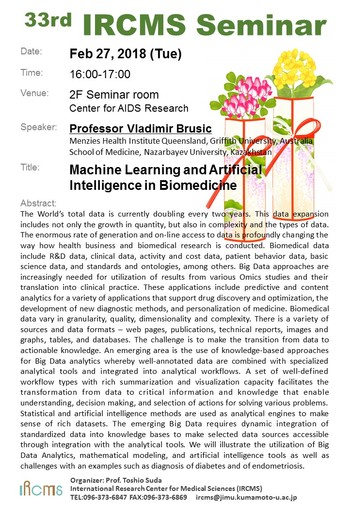- HOME
- IRCMS Seminars
- 33rd IRCMS Seminar
IRCMS Seminars
33rd IRCMS Seminar
February 20 2018
We would like to inform you that the 33rd IRCMS Seminar has been scheduled as below. We would be pleased to see many of you participating in the seminar.
Date : February 27, 2018 (Tue)
Time : 16:00 - 17:00
Venue : 2F Seminar room, Center for AIDS Research
Speaker : Professor Vladimir Brusic
Menzies Health Institute Queensland, Griffith University, Australia
School of Medicine, Nazarbayev University, Kazakhstan
"Machine Learning and Artificial Intelligence in Biomedicine"
The World's total data is currently doubling every two years. This data expansion includes not only the growth in quantity, but also in complexity and the types of data. The enormous rate of generation and on-line access to data is profoundly changing the way how health business and biomedical research is conducted. Biomedical data include R&D data, clinical data, activity and cost data, patient behavior data, basic science data, and standards and ontologies, among others. Big Data approaches are increasingly needed for utilization of results from various Omics studies and their translation into clinical practice. These applications include predictive and content analytics for a variety of applications that support drug discovery and optimization, the development of new diagnostic methods, and personalization of medicine. Biomedical data vary in granularity, quality, dimensionality and complexity. There is a variety of sources and data formats - web pages, publications, technical reports, images and graphs, tables, and databases. The challenge is to make the transition from data to actionable knowledge. An emerging area is the use of knowledge-based approaches for Big Data analytics whereby well-annotated data are combined with specialized analytical tools and integrated into analytical workflows. A set of well-defined workflow types with rich summarization and visualization capacity facilitates the transformation from data to critical information and knowledge that enable understanding, decision making, and selection of actions for solving various problems. Statistical and artificial intelligence methods are used as analytical engines to make sense of rich datasets. The emerging Big Data requires dynamic integration of standardized data into knowledge bases to make selected data sources accessible through integration with the analytical tools. We will illustrate the utilization of Big Data Analytics, mathematical modeling, and artificial intelligence tools as well as challenges with an examples such as diagnosis of diabetes and of endometriosis.

